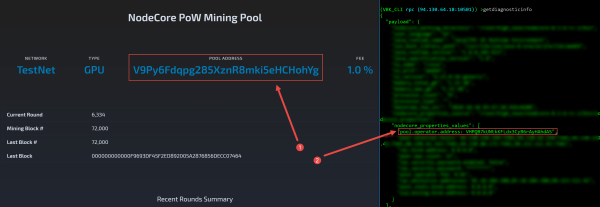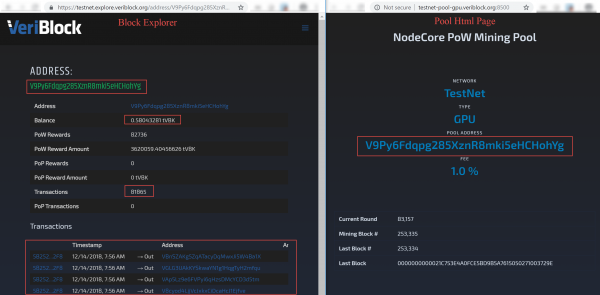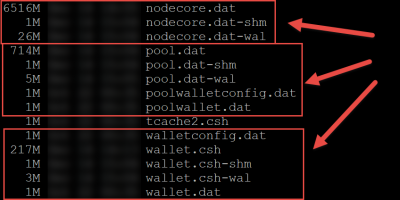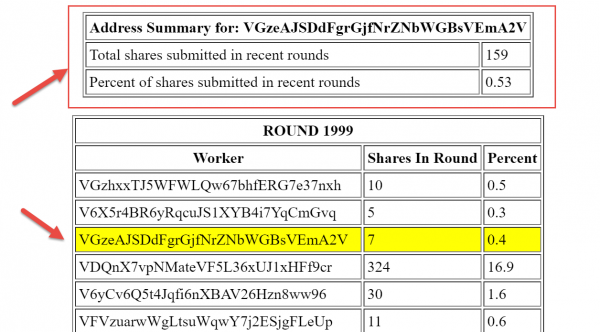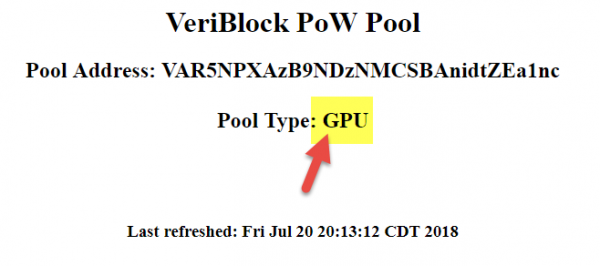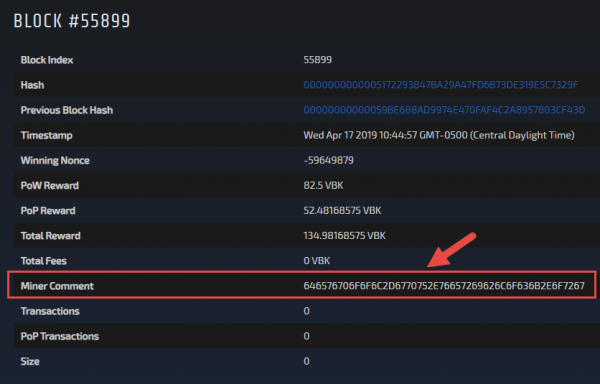Difference between revisions of "HowTo run and connect to PoW Miner pool"
VeriBlockTim (talk | contribs) |
|||
| Line 20: | Line 20: | ||
== Setup a Pool == | == Setup a Pool == | ||
| + | |||
| + | After block 1512000, and the fork to vProgPoW, pool operators must use the following settings for the vProgPoW pool stratum. | ||
| + | |||
| + | stratum.mining.bind.address=0.0.0.0 | ||
| + | stratum.mining.bind.port=8502 | ||
Modify the nodecore.properties file: | Modify the nodecore.properties file: | ||
Revision as of 18:09, 21 September 2020
See: Main_Page, NodeCore_Networking
See also: List_of_mining_pools_testnet
Contents
Overview
A brand new pool will start at Current Round = 1, as the Current Round is based on number of blocks won... not to be confused with the current blockchain height
- Current Round: X - the blocks that have been won by this pool. This increments each time the pool wins a new block.
- Pool Mining Block: Y - the current block the pool is working on
- Blockchain height: Z - the height of the blockchain
Once a round is won, then the pool payouts the reward from the block proportionally to all the shares submitted.
For example, if you mine on a pool for 10 minutes, and it wins a block (block time is targeted for every 30 seconds, other pools may win other blocks in the meantime), and you contributed 10% of the shares to that round, then you will receive approximately 10% of the block reward (less pool fees).
Technical note - The pool data is stored in the file: "\testnet\poolshares-normal.txt". Is that is deleted, then the html page will start anew.
Setup a Pool
After block 1512000, and the fork to vProgPoW, pool operators must use the following settings for the vProgPoW pool stratum.
stratum.mining.bind.address=0.0.0.0 stratum.mining.bind.port=8502
Modify the nodecore.properties file:
#Allow the pool statistics page to be reachable from any remote host pool.stats.bind.address=0.0.0.0 #Allow the UCP pool server to be reachable from any remote host ucp.mining.bind.address=0.0.0.0 #set the pool fee # Decimal value between 0 and 1, representing a percentage, i.e. 0.01 = 1% pool.operator.fee=0.01 #set the address the pool fees are paid out to. # NOTE: This should be different than the pool address that appears on the website. pool.operator.address=VHPQB7kUNtkKFLdx3CyB6rAyHAhdAS #on nodecore start, automatically run the pool pool.standard.autostart=GPU #OPTIONAL - inject custom html into pool pool.custom.html=pool_html_file.txt #OPTIONAL - specify some miner comment that will show up the blockchain, such as your pool name or url pool.operator.comment=myPool
- Run an instance of NodeCore
- In the NodeCore_CommandLine, run startpool, either for CPU or GPU. Note that one instance of nodecore supports only 1 pool. If you want both a CPU and GPU, then you'll need to run two instances of NodeCore, one for each.
- Run 'startpool CPU'
- Run 'startpool GPU'
- Make note of the public IP (pool miners will connect to this)
- Open firewall ports for 8500/tcp and 8501/tcp such that other clients can connect
Opening firewall ports will vary per OS and version. One set of commands is:
firewall-cmd --permanent --add-port=8500/tcp firewall-cmd --permanent --add-port=8501/tcp firewall-cmd --reload
Note the Pool Address is created by the pool service, and is separate from the 'pool.operator.address' that the fee is paid to.
Choose a CPU or GPU pool
A pool can be either CPU or GPU. Simply pass in the type to the command line:
#CPU startpool CPU #GPU startpool GPU
Set the auto-restart option
For better pool stability, set nodecore.properties to auto-restart the pool. When nodecore starts (or restarts), it will automatically start the pool without needing to run the NC_CLI startpool command.
pool.standard.autostart = GPU
For a solo pool, just specify the address:
pool.solo.autostart=V5QCsNjm8nzqWi1ymHtF3GWPEDsd2g
Set custom html for your pool
This is optional, but if you wanted to add custom html to the top of your pool's web page, such as your website or a contact, then set the nodecore.properties file:
pool.custom.html=pool_html_file.txt
"pool_html_file.txt" is relative to the bin folder.
This takes the contents of the file and injects it directly into the top of the pool html page as an html snippet.
See: HowTo_run_and_connect_to_PoW_Miner_pool#How_to_inject_custom_HTML_into_the_pool
Update memory
Modify nodecore or nodecore.bat to allow Java to use more memory instead of the default 6. Consider 16g, 24g, or 32g depending on your pool size.
# Add default JVM options here. You can also use JAVA_OPTS and NODECORE_OPTS to pass JVM options to this script. DEFAULT_JVM_OPTS='"-XX:+HeapDumpOnOutOfMemoryError" "-Dio.netty.noUnsafe=true" "-Xmx16g"'
Configurations
- The log level can be changed: HowTo_run_NodeCore#How_to_set_NodeCore_log_level. A high level (default) provides more detail in case something went wrong, but takes more resources.
- The ports can be changed in Nodecore.properties
- ucp.mining.bind.port=8501
- pool.stats.bind.port=8500
Starting in NodeCore 0.4.6:
- pool.cycle.time
Added nodecore properties for pool operators: "pool.cycle.time". It is an integer representing the number of milliseconds between recalculation of pool mining jobs. The default value is 3000 (3 seconds), which differs from prior versions of NodeCore that were using a fixed 500ms schedule.
Run in a loop
If for whatever reason NodeCore crashes, you'll want to run it in a loop that auto-restarts for best uptime. Consider a script like so:
Windows : "nodecore-loop.bat"
:execute call nodecore.bat echo ---------------------------------------------------------------------- echo ^| NodeCore is restarting in 30 seconds! ^| echo ^| Press CTRL+C to cancel this or ENTER to proceed immediately... ^| echo ---------------------------------------------------------------------- timeout /t 30 > NUL echo Restarting NodeCore... goto execute
Linux : "nodecore-loop"
while true
do
./nodecore
echo ----------------------------------------------------------------------
echo ": NodeCore is restarting in 30 seconds! :"
echo ": Press CTRL+C to cancel this or ENTER to proceed immediately... :"
echo ----------------------------------------------------------------------
read -t 30
echo Restarting NodeCore...
done
What success looks like
There will be two addresses: (1) the pool address (on the pool html page), (2) the pool owner's address that any fees are sent to.
A pool wins a block, and then sends many transactions to all the contributing workers:
- The address from the pool html page should exist in the block explorer
- This usually has a very small balance, such as between 0 and 1 block reward
- Once a block has been won, it has transactions (to send the reward to all the contributing workers)
The file structure in the testnet folder will look something like so:
- 3 groups of files for nodecore.dat, pool.dat, and wallet.dat
Checklist
- Html page shows up, per success screenshots above
- For a public pool, reach out on Telegram/Discord to make sure it's listed here: List_of_mining_pools_testnet
- Join the pool community on Discord: https://discord.gg/phazWBE
- Some pool monitoring. The pool exposes an API like so: http://<your_pool_url>:8500/api/summary. Set up your favorite http monitoring tool to alert you if your pool goes down
- Auto-restart script (listed above). If for whatever reason your pool dies, you'll want NodeCore to instance restart
- Some anti-DDOS protection. If you're a pool admin, reach out to the pool channels on discord
Connect to an Existing Pool
- Run the PoW Miner
- Specify thread count to mine on
- Connect to the IP and port provided by the pool owner (Note that pools generally want to maximize users, to pools binding to 0.0.0.0 allow connections from any IP)
- Enter the address to mine to (run getinfo from the NodeCore_CommandLine)
You can see pool results by viewing the web page:
http://<IP_Address>:8500
API
View a specific address
Not really an API, but will highlight address in the HTML page and show an address summary
http://testnet-pool-gpu.veriblock.org:8500?address=VEcTwuZfAmBABEFTguoYgyQVR55Job
View pool summary
Breakign change, as of 0.3.4:
http://testnet-pool-gpu.veriblock.org:8500/api/summary
{
"network": "TestNet",
"poolType": "GPU",
"poolAddress": "VJ2WZN7nB4AVDJZc2Sg1whwJLAUPNr",
"fee": 0.0,
"currentRoundNumber": 2,
"miningBlockNumber": 48267,
"lastBlockNumber": 48266,
"lastBlockHash": "00000000000187D3269B861CA088C7C188D8617A74E89993",
"recentRoundsIncluded": 1,
"recentRoundsTotalShares": 183,
"recentRoundsAverageShares": 183,
"recentHashRate": 1209198484,
"displayAddress": false,
"recentRoundsSingleAddressShares": 0,
"recentRoundsSingleAddressPercent": 0.0,
"applicationVersion": "VeriBlock NodeCore v0.3.4",
"nodeCoreStartTime": 1538408980,
"timestamp": "Oct 1, 2018 6:01:33 PM"
}
FPGA Pools
This is available with NodeCore 0.4.2-rc.3 and greater.
There is a beta for FGPA pools. This is being shared on Discord (https://discord.gg/wJZEjry).
This is run just like a normal pool, except set the type to "FPGA" instead of "GPU".
startpool FPGA
See: List_of_mining_pools#FPGA_Pools
Useful NC_CLI pool commands
Get Information
- getpoolinfo (see: NodeCore_CommandLine#getpoolinfo )
- getstateinfo (see: NodeCore_CommandLine#getstateinfo )
- getdiagnosticinfo (see: NodeCore_CommandLine#getdiagnosticinfo )
Start and Stop the pool
- startpool (see: NodeCore_CommandLine#startpool )
- startsolopool (see: NodeCore_CommandLine#startsolopool )
- stoppool (see: NodeCore_CommandLine#stoppool )
- restartpoolwebserver --> restart just the web page without affecting NodeCore or miners (see: NodeCore_CommandLine#restartpoolwebserver )
Security
- listbannedminers (see: NodeCore_CommandLine#listbannedminers )
- clearpoolbans (see: NodeCore_CommandLine#clearpoolbans )
FAQ
Should I pool or solo mine?
Joining a pool reduces the variance.
If you join a pool, you are more likely to get a trickle of rewards because the pool has higher hashing rate, but splits among all the members. Pools will also have an operator fee, but that is negligible.
- If you join a bigger pool (more hashes), then you are likely to get a more frequent trickle, but of smaller rewards because it's split among more people
- If you join a smaller pool (less hashes), then you are likely to get less frequent rewards... but when (if) they come they'll be larger because it's split among less people
If you solo mine, when (if) you do a get a reward then you get the whole thing. If you solo mine at 1/10000 of the total network hash, statistically within 10000 blocks you will win a block and get the whole reward.
There is not a right or wrong answer to (1) Should I join a pool or solo mine, or (2) should I join a big pool or a small pool.
What is the difference between a CPU vs. GPU pool?
CPU and GPU should connect to different pools.
On a high-end GPU, the GPU miner is roughly 400 times faster than the CPU miner on a high-end CPU.
In order to accommodate both types of mining, we have two different modes for the pool software which either accept shares at an appropriate difficulty for CPU miners, or an appropriate difficulty for GPU miners. Solo pools do not have to do this, because they can simply allow shares at any difficulty to be submitted, as the number of shares submitted by a particular miner is not relevant to payouts (since all payouts go to one address).
The pool software when running in GPU mode will accept shares that represent roughly 4.26 GH of mining, and in CPU mode will accept shares that represent roughly 16.7 MH of mining. If mining on a public pool (a pool where other people are also mining), please ensure that the pool is running in the appropriate mode for your miner.
How do I know if I'm connecting to a CPU or GPU pool?
NodeCore pool should clearly tell. If it does not, ask the pool operator to upgrade NodeCore.
For example, this is a CPU pool:
GPU pool should say "GPU".
How to inject custom HTML into the pool
As of 0.3.11, NodeCore allows the ability to inject an HTML snippet into the pool html page.
In the nodecore.properties file, set the 'pool.custom.html=your-html-file-name.html'. This file will be injected into the top of the pool.
The pool html file's path is relative to the "bin" folder (so put the "your-html-file-name.html" file in "bin")
This requires restarting the whole NodeCore instance to first take affect. But once the nodecore.prop file is set, the content will be auto-picked up by the pool with each page refresh.
Can I set a miner comment for blocks my pool wins?
Yes, as of 0.4.3
In nodecore.properties, set:
pool.operator.comment=myPool
This will show up in the blockchain and be visible in the explorer (shows us as HEX and not ASCI):
Troubleshooting
Cannot see the pool web page
Check for http (as in http://<IP_Address>:8500), not https
Ensure that the nodecore.properties file has been updated per above steps (and NodeCore was restarted).
Ensure that firewall ports are open for 8500/tcp and 8501/tcp
I start the pool but another computer can not connect its IP
Set this option in your nodecore.properties file (See: Nodecore.properties)
ucp.mining.bind.address=0.0.0.0
And restart NodeCore and the pool software
Error: unable to start pool Starting pool failed: the port 8500 is already bound on 127.0.0.1!
Ensure that the nodecore.properties file is updated per above, and restart nodecore.
Related:
Unable to start HTTP server! java.net.BindException: Address already in use: bind
Ensure that nothing is binding on port 8500
This could be:
- A second instance of NodeCore
- Another process that coincidentally used 8500
- A web server configuration/redirect that somehow "locks up" port 8500
To check for processes bound on port 8500:
In Windows:
- In an admin cmd window, run "netstat -a -b"
- Check Resource Monitor
In Linux:
- Run "netstat -tulpn"
Pool is stuck at round 1
Troubleshooting questions to check:
- Is there a miner connecting to it?
- If you run NC_CLI getinfo, does it show the latest block (i.e. does NodeCore appear to be updating)?
Pool is stuck at block X
This should not happen, but if it does... have the administrator restart nodecore on the server.
Pool html page not showing up
Run this NC_CLI command:
restartpoolwebserver
It only restarts the web page, it does not kick out miners.
General Troubleshooting tips
Make sure that it works locally:
- You can connect a miner on 127.0.0.1
- You can view the html page at http://127.0.0.1:8500
- You can connect NC_CLI on 127.0.0.1 and run getInfo and it shows the latest block
Make your you're connecting to the right ports:
The website is on port 8500 http://111.194.224.159:8500/ The miner connects to port 8501 111.194.224.159:8501
